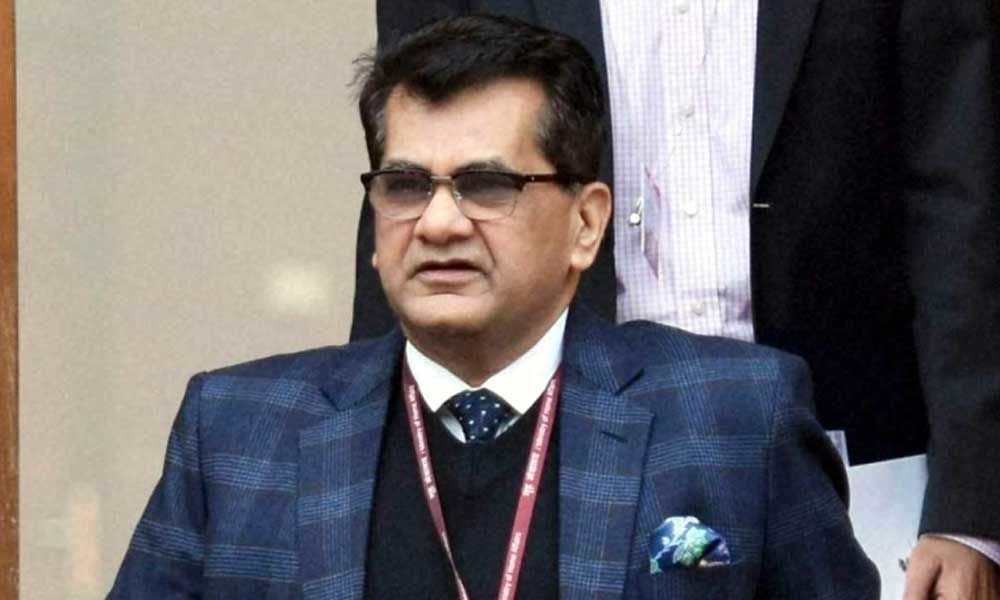Live
- 7-Year-old girl sexually assaulted in Tirupati
- PM Modi highlights govt's efforts to make Odisha prosperous and one of the fastest-growing states
- Hezbollah fires 200 rockets at northern, central Israel, injuring eight
- Allu Arjun's Family Appearance on Unstoppable with NBK Breaks Viewership Records
- Unity of hearts & minds essential for peace & progress, says J&K Lt Governor
- IPL 2025 Auction: I deserve Rs 18 cr price, says Chahal on being acquired by Punjab Kings
- EAM Jaishankar inaugurates new premises of Indian embassy in Rome
- Sailing vessel INSV Tarini embarks on second leg of expedition to New Zealand
- Over 15,000 people affected by rain-related disasters in Sri Lanka
- IPL 2025 Auction: RCB acquire Hazlewood for Rs 12.50 cr; Gujarat Titans bag Prasidh Krishna at Rs 9.5 crore
Just In
India has game plan for electric vehicles, says NITI Aayog CEO Amitabh Kant


Addressing a conference on sustainable mobility through video link, Kant said the country's EV focus should mainly be on a two-wheeler and three-wheeler vehicles and public transport.
AHMEDABAD: India has put in place a game plan for electric vehicles (EV) and its components like batteries to ensure clean cities, reduce imports and utilise solar power, NITI Aayog CEO Amitabh Kant said here on Saturday.
He said domestic battery manufacturing for electric vehicles provides a "massive market opportunity", and also quickens the transition to such environment-friendly transport, which is vital for the country to help combat pollution, congestion, strengthen energy security and create jobs.
Addressing a conference on sustainable mobility through video link, Kant said the country's EV focus should mainly be on a two-wheeler and three-wheeler vehicles and public transport.
"We have a game plan to drive electric vehicles, particularly two and three-wheelers, public transport and manufacturing of batteries in India.
Our objective is that we should first work on about 80 per cent of components of two and three-wheelers and buses and also push manufacturing of batteries in India," Kant said.
"Our objective is to clean up cities, reduce imports, and utilise the sun and its energy for driving electric vehicles," the said.
"From the perspective of energy security and competitive advantage, new mobility solutions will reduce oil import costs, lower India's trade deficit and limit our vulnerability to oil supply disruptions," Kant said.
With low per capita car ownership, which currently is 20 vehicles per 1000 people, India has an opportunity to leapfrog ahead of the legacy model of individually owned internal combustion Indian vehicles that are utilised by only 5 per cent of the people, he said.
"India's low per capita car ownership affords the chance to pursue a different model from the western world.
Our emphasis must be shared, connected electric transportation," he said.
He said to create a unique eco-system to enable 'Make in India', and drive the movement for manufacturing in India, the country will require a phased programme across the entire value chain, an efficient fiscal impact structure, and size and scale aligned to the country's ambition to produce world-class vehicles for domestic and international markets.
"With batteries accounting for almost 40 per cent of total cost of EVs today, domestic battery manufacturing is a massive market opportunity for India to rapidly enable the transition to EVs," Kant said.
"New battery technologies like solid-state lithium-ion battery, sodium-ion battery, and silicon-based batteries are underdeveloped.
India needs to vigorously pursue research and development and have a clear road map for manufacturing on a mega scale," he said.
To facilitate charging infrastructure, Kant said newer models should be explored and start-ups must be facilitated in this area.
He said new cities like Dholera (coming up near Ahmedabad) should allow maximum number of EVs.
Talking to reporters on the sidelines of the conference, Chief Secretary J N Singh said Gujarat is poised to lead in the field of e-mobility.
"Dholera is emerging as a very important township for this. A big company will announce investment in Dholera in lithium-ion battery manufacturing for EVs. We plan to develop a 5,000-MW solar power plant, and 250 MW plant will be ready soon," Singh said.
"We are in the last stage of discussion with Tata Chemicals for lithium-ion battery manufacturing plant.
The battery is vital for e-vehicles and comprises 40 per cent of car cost," he said.

© 2024 Hyderabad Media House Limited/The Hans India. All rights reserved. Powered by hocalwire.com






